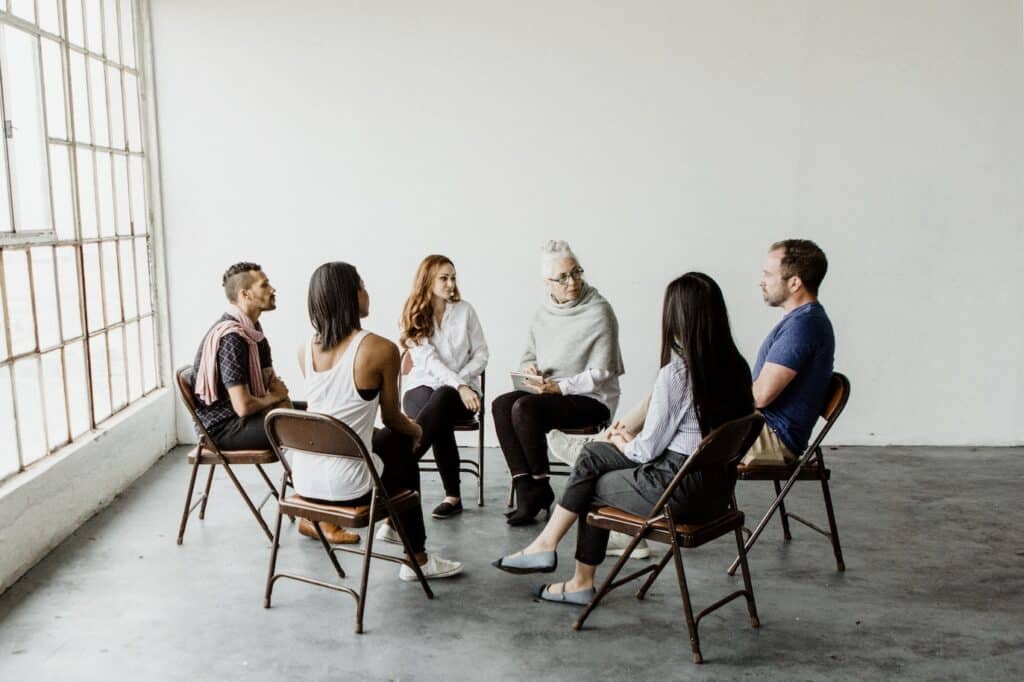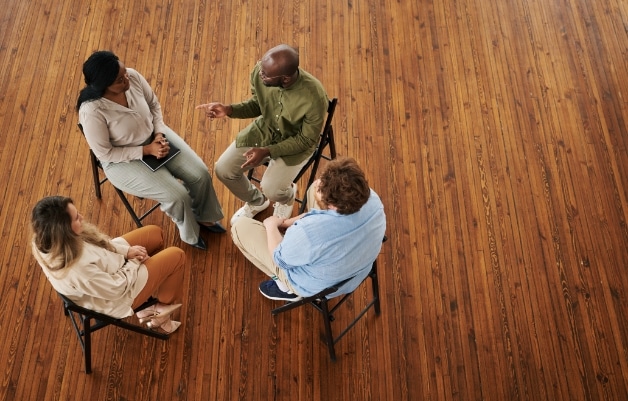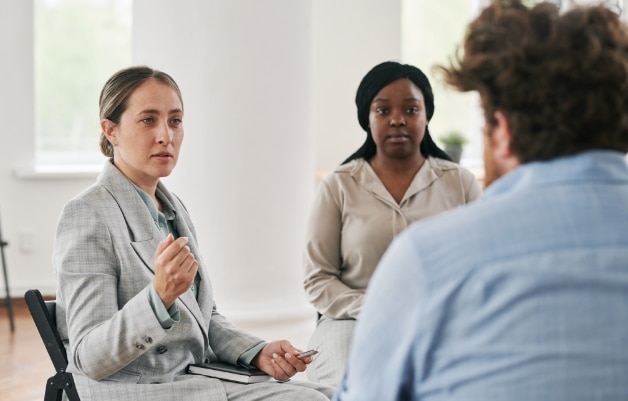A MISSION FOR MICHAEL
In AMFM’s group therapy sessions, you’ll draw strength from others’ experiences and practice new skills.

Group therapy can be a powerful force for healing and connection – there’s something deeply life-affirming about connecting with other people who have gone through the same struggles. In group therapy, individuals come together under the leadership of a trained therapist to share experiences, challenges, and victories.
Members come away stronger not just from the therapy itself, but also from witnessing and contributing to other people’s healing journey. Everyone involved benefits from the group’s collective wisdom and shared coping mechanisms.
At AMFM, our group therapy sessions are warm and positive, and we focus on making sure that every participant feels valued and understood. They’re designed to complement individual therapy and other interventions clients are receiving. Group therapy provides a much-needed broader, community-based perspective on recovery.
In group therapy, you’ll have a chance to practice new skills in a supportive setting, get perspective from the experiences of others, and build relationships that reinforce your personal growth. AMFM’s group therapy aims to encourage you as you navigate the complexities of recovery with the support of a compassionate, understanding community.

Here’s how group therapy can be a catalyst for positive change:
As you watch others navigate similar challenges or achieve milestones, you’ll gain motivation, propelling your own growth.
A group therapy session gives you an unmatched emotional lift. Support and validation from other members can help you heal.
In group therapy, you get a mirror to your own behavior through other people’s actions and stories, which encourages change and personal growth.
One of the most powerful aspects of group therapy is the sense of community it fosters. Connecting with others who understand your journey reminds you that you’re not alone in your challenges.
Group therapy isn’t just about talking; it’s about doing. It offers a safe space to practice new skills, from communication to coping strategies, so that you’re better prepared to apply these skills in your daily life.
When you participate in group therapy sessions, you’re not just working towards recovery; you’re building a foundation for a more fulfilled and connected life.
When you attend group therapy, you can expect a comfortable environment oriented around open dialogue and shared healing. Sessions typically last about 60 to 90 minutes and include different activities, including guided discussions, skill-building exercises, and sometimes, mindfulness practices. The therapist facilitator will guide the group, keeping everyone on track and making sure no one feels uncomfortable. Discussion topics are wide-ranging, aiming to address common challenges, celebrate successes, and explore new coping strategies. Overall, the session’s flow is intended to make sure everyone has the opportunity to contribute, listen, and learn from one another’s experiences.
Adding new people to an existing group is always handled with care and thoughtfulness. Newcomers are introduced the right way so they feel immediately part of the group. Facilitators fill the new members in on group norms and expectations, so they can understand the group’s dynamics and how they can actively participate. We don’t just throw you into a group and say “good luck”- we want to foster a quick sense of belonging and comfort within the group, so you can hit the ground running.
Safety and confidentiality are cornerstones of group therapy at AMFM. Creating a safe environment requires confidentiality agreements, which remind members to respect each other’s privacy. Having this commitment helps build trust, which is key for members to feel safe being vulnerable with each other.
Before we dive into the various forms depression can take, let’s remember: diagnoses are tools for understanding. They group common symptoms together to guide treatment, but they don’t define your experience. Each person’s journey with depression is unique, and these categories simply help us start the conversation about finding the best path forward:

The therapist facilitator of a therapy group has an important job in sessions: they make sure everyone’s voice is heard. Social settings can be uncomfortable for some people, so therapists are careful to encourage active participation in a way that feels comfortable and respectful to everyone. With guided discussions, shared activities, and reflective exercises, facilitators keep sessions dynamic and interactive, allowing members to engage at their own pace.
Mental health struggles often come with a lie that says, “you’re alone.” Group therapy is a powerful way to combat that lie. In fact, it’s peer relationships that make group therapy so special. In the therapy room, structured activities and spontaneous conversations create opportunities to build deep connections between group members. Members see their own experiences reflected in others, leading to empathy, understanding, and shared insights.


Without safety and trust, group therapy doesn’t work. Therapist facilitators know just how to establish and maintain a space where members feel safe to share their deepest thoughts and listen to others. Confidentiality, respect, and non-judgmental listening are non-negotiables in group therapy sessions. This foundational safety and trust allows the group to flourish.
Call us or start the process online today. All communication is confidential.
If we are not an appropriate provider for care, we will assist in finding a care provider that can help.
Our commitment to clinical excellence is reflected in our rigorous adherence to industry standards. We hold licenses and accreditations from respected regulatory bodies, ensuring that our services meet the highest levels of quality and compliance. Listed below are the certifications that endorse our dedication to providing safe, ethical, and effective care.
Copyright 2024 © A MISSION FOR MICHAEL
All rights Reserved | Privacy Policy